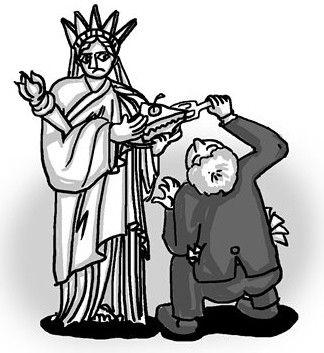

Illustration: Lu Ting/GT
Private equity investor Fosun International is closing in on a landmark but controversial deal to buy US publishing giant Forbes Media, which would become the first purchase of a major Western media firm by a Chinese company. The deal is almost certain to draw attention in the US where Forbes is based, with some calling for the government to stop the sale over concerns that Fosun could interfere with Forbes' editorial independence and block publication of sensitive content.
But Washington should demonstrate its commitment to free trade and allow the sale to proceed, which could ultimately help to build trust in the US-China relationship if Fosun shows it can respect Western publishing standards and reverse Forbes' declining performance.
The Sino-US trade relationship has undergone a series of positive and negative developments over the last two years, resulting in an atmosphere of cooperation tempered with distrust. US decisions to ban the import of Chinese telecoms equipment over security concerns and to impose anti-dumping tariffs on Chinese made solar panels have boosted tensions.
But on the positive side, both the US and China have demonstrated a broader commitment to fair trade by approving a number of mergers and acquisitions (M&A) in sensitive areas like food, media and energy. Those include the Chinese government's approval of the sale of its leading hotpot restaurant chain Little Sheep to US fast-food giant Yum! Brands in 2011, and Washington's approval last year of the sale of leading US pork producer Smithfield to China's WH Group, previously known as Shuanghui.
Washington has also allowed a number of other sensitive sales to Chinese buyers to proceed, including those of clean technology company A123 Systems, leading theater chain operator AMC Entertainment, and Nexen, one of Canada's top energy exploration companies.
This new deal involving Fosun will put Washington's increasingly open attitude toward Chinese M&A of US firms to a new test, as it would involve the first direct purchase of a major company in the highly sensitive media space. Word that Fosun was pursuing a purchase first emerged in January, and last week the latest reports said the Chinese company was nearing a deal that would see it pay less than $250 million for the US publishing giant.
That price would be well below the $400 to $500 million that the Forbes family was originally seeking, reflecting the reality that business is rapidly declining for traditional print publishers like Forbes due to the challenge from new media. Similar pressure recently led the family which owned The Washington Post for decades to sell the storied newspaper to Internet mogul Jeff Bezos, founder of e-commerce giant Amazon.
Some might argue that a Chinese company can't be trusted to maintain editorial independence at a major Western publisher like Forbes. But Fosun is hardly a traditional Chinese media company. The firm is a privately owned private equity firm that functions like its Western peers by buying undervalued assets and trying to improve their performance. That's far different from most traditional Chinese media firms that are State-owned and in the long-term business of running newspapers, TV stations, magazines and Internet sites.
Fosun has been one of China's most active private equity firms to date on the global stage, buying major stakes over the last two years in a range of assets from French resort operator Club Med to Caixa Geral de Depósitos, Portugal's leading insurance company. In most cases Fosun, like any private equity buyer, aims to boost profitability at its acquisitions and then sell them for a profit. There's no reason to believe it would do any differently if it acquires Forbes.
Fosun would also have the advantage over rival bidders of a previous relationship with Forbes through their operation of a Chinese-language Forbes for readers in Fosun's home China market.
Of course there's no guarantee that Fosun might not try to influence editorial decisions if its bid to buy Forbes succeeds, and US free speech advocates will undoubtedly be closely watching for any signs of changes if a deal ultimately materializes. But Fosun has the credentials, motivations and background that would minimize the chances of such interference, and on a more positive note its successful purchase and operation of Forbes could help to boost mutual trust in the important but fractious US-China trade relationship.
Fosun in bidding for Forbes Media
2014-01-17Fosun buys Portuguese insurer for $1.4b
2014-01-11Fosun buys 60-story Manhattan tower
2013-10-21Bona wins $20 million Fosun investment
2013-10-10Chinese tycoon boasts of bid for NY Times
2013-12-31Copyright ©1999-2018
Chinanews.com. All rights reserved.
Reproduction in whole or in part without permission is prohibited.